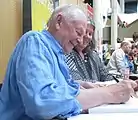61st Academy Awards
The 61st Academy Awards ceremony, organized by the Academy of Motion Picture Arts and Sciences (AMPAS), honored the best films of 1988, and took place on Wednesday, March 29, 1989, at the Shrine Auditorium in Los Angeles, beginning at 6:00 p.m. PST / 9:00 p.m. EST.[1] During the ceremony, AMPAS presented Academy Awards (commonly referred to as Oscars) in 23 categories. The ceremony, televised in the United States by ABC, was produced by Allan Carr and directed by Jeff Margolis.[1] Ten days earlier, in a ceremony held at the Beverly Hills Hotel in Beverly Hills, California, the Academy Awards for Technical Achievement were presented by host Angie Dickinson.[2]
| 61st Academy Awards | |
|---|---|
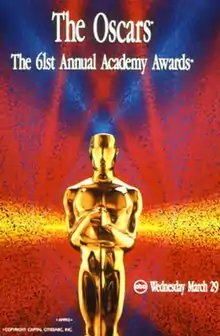 Official poster | |
| Date | March 29, 1989 |
| Site | Shrine Auditorium Los Angeles, California, U.S. |
| Produced by | Allan Carr |
| Directed by | Jeff Margolis |
| Highlights | |
| Best Picture | Rain Man |
| Most awards | Rain Man (4) |
| Most nominations | Rain Man (8) |
| TV in the United States | |
| Network | ABC |
| Duration | 3 hours, 19 minutes |
| Ratings | 42.68 million 29.81% (Nielsen ratings) |
Rain Man won four awards, including the Best Picture. Other winners included Who Framed Roger Rabbit with four awards, Dangerous Liaisons with three, and The Accused, The Accidental Tourist, A Fish Called Wanda, The Appointments of Dennis Jennings, Beetlejuice, Bird, Hôtel Terminus: The Life and Times of Klaus Barbie, The Milagro Beanfield War, Mississippi Burning, Pelle the Conqueror, Tin Toy, Working Girl, and You Don't Have to Die with one. The telecast garnered over 42 million viewers in the United States, making the most viewed ceremony up to that point until it was surpassed by the 70th Academy Awards in 1998, which garnered a viewership of over 57 million.[3][4]
Winners and nominees
The nominees for the 61st Academy Awards were announced on February 15, 1989, at the Samuel Goldwyn Theater in Beverly Hills, California, by Richard Kahn, president of the Academy, and actress Anne Archer.[5] Rain Man led all nominees, with eight nominations; Dangerous Liaisons and Mississippi Burning tied for second with seven each.[6]
The winners were announced at the award ceremony on March 29, 1989.[7] Best Actress winner Jodie Foster became the eighth person in history to win the aforementioned category for a film with a single nomination. The last person to achieve this feat was Sophia Loren when she won for Two Women in 1961. Best Actor winner Dustin Hoffman was the fifth person to win the aforementioned category twice.[8] Sigourney Weaver became the fifth performer to receive two acting nominations in the same year[9] but did not win in either category.[10] John Lasseter and William Reeves won Best Animated Short Film for Tin Toy, which was Pixar's first Oscar ever and was the first CGI film to win an Oscar.[11]
Awards
Winners are listed first, highlighted in boldface and indicated with double dagger (![]() ).[12]
).[12]
|
Best Picture
|
|
|
|
|
|
|
Best Screenplay Written Directly for the Screen
|
Best Screenplay Based on Material from Another Medium
|
|
Best Foreign Language Film
|
Best Documentary Feature
|
|
Best Documentary Short Subject
|
Best Live Action Short Film
|
|
Best Animated Short Film
|
Best Original Score
|
|
Best Original Song
|
Best Sound
|
|
Best Sound Effects Editing
|
Best Art Direction
|
|
Best Makeup
|
Best Costume Design
|
|
Best Cinematography
|
Best Film Editing
|
Best Visual Effects
|
Academy Honorary Awards
- National Film Board of Canada[13]
- Eastman Kodak Company[14]
Special Achievement Award
- Richard Williams "for the animation direction of Who Framed Roger Rabbit".[15]
Films with multiple nominations and wins
|
The following 17 films received multiple nominations:
|
The following three films received multiple awards:
Note: Who Framed Roger Rabbit received 3 competitive Academy Awards of Merit. In addition, the film received a Special Achievement Award. |
Presenters and performers
The following individuals, listed in order of appearance, presented awards or performed musical numbers:[16]
Presenters
| Name(s) | Role |
|---|---|
| Charlie O'Donnell | Announcer for the 61st annual Academy Awards |
| Richard Kahn (AMPAS president) | Gave opening remarks welcoming guests to the awards ceremony |
| Tom Selleck | Introducers of presenters Melanie Griffith and Don Johnson |
| Melanie Griffith Don Johnson | Presenters of the award for Best Supporting Actress |
| Jane Fonda | Presenter of the film Rain Man on the Best Picture segment |
| Kim Novak James Stewart | Presenters of the awards for Best Sound and Best Sound Effects Editing |
| Robert Downey Jr. Cybill Shepherd | Presenters of the award for Best Makeup |
| Patrick Swayze | Presenter of film tribute to 1950s movie musicals and the award for Best Original Score |
| Olivia Newton-John | Introducer of presenters Donald Sutherland and Kiefer Sutherland |
| Donald Sutherland Kiefer Sutherland | Presenters of the Academy Honorary Award to the National Film Board of Canada |
| Anjelica Huston | Presenter of the film Mississippi Burning on the Best Picture segment |
| Willem Dafoe Gene Hackman | Presenters of the award for Best Art Direction |
| Bo Derek Dudley Moore | Presenters of the award for Best Costume Design |
| Billy Crystal | Presenter of the movie tap dancers and Best Original Song performances montage |
| Sammy Davis Jr. Gregory Hines | Presenters of the award for Best Original Song |
| Candice Bergen Jacqueline Bisset Jack Valenti | Presenters of the award for Best Foreign Language Film |
| Barbara Hershey | Presenter of the film The Accidental Tourist on the Best Picture segment |
| Michael Caine Sean Connery Roger Moore | Presenters of the award for Best Supporting Actor |
| Beau Bridges Jeff Bridges Lloyd Bridges | Presenters of the award Best Visual Effects |
| Walter Matthau | Introducer of presenters Lucille Ball and Bob Hope |
| Lucille Ball Bob Hope | Introducers of the performance of the "I Wanna Be an Oscar Winner" musical number |
| Geena Davis Jeff Goldblum | Presenters of the award for Best Documentary Short Subject |
| Edward James Olmos Max von Sydow | Presenters of the award for Best Documentary Feature |
| Anne Archer | Presenter of the film Dangerous Liaisons on the Best Picture segment |
| Charles Fleischer Robin Williams | Presenters of the Special Achievement Academy Award to Richard Williams |
| Demi Moore Bruce Willis | Presenter of the award for Best Cinematography |
| Carrie Fisher Martin Short | Presenters of the awards for Best Live Action Short Film and Best Animated Short Film |
| Michael Douglas | Presenter of the award for Best Actor |
| Ali MacGraw | Presenter of the film Working Girl on the Best Picture segment |
| Farrah Fawcett Ryan O'Neal | Presenters of the award for Best Film Editing |
| Angie Dickinson | Presenter of the segment of the Academy Awards for Technical Achievement and the Gordon E. Sawyer Award |
| Richard Dreyfuss Amy Irving | Presenters of the award Best Original Screenplay |
| Michelle Pfeiffer Dennis Quaid | Presenters of the award for Best Adapted Screenplay |
| Goldie Hawn Kurt Russell | Presenters of the award for Best Director |
| Tom Cruise Dustin Hoffman | Presenters of the award for Best Actress |
| Cher | Presenter of the award for Best Picture |
Performers
| Name(s) | Role | Performed |
|---|---|---|
| Marvin Hamlisch | Musical arranger | Orchestral |
| Army Archerd Eileen Bowman Coral Browne Cyd Charisse Dale Evans Alice Faye Merv Griffin Dorothy Lamour Rob Lowe Tony Martin Vincent Price Buddy Rogers Roy Rogers Lily Tomlin | Performers |
"I Only Have Eyes for You" from Dames |
| Keith Coogan Patrick Dempsey Corey Feldman Joely Fisher Tricia Leigh Fisher Savion Glover Carrie Hamilton Melora Hardin Ricki Lake Matt Lattanzi Chad Lowe Tracy Nelson Patrick O'Neal Corey Parker D. A. Pawley Tyrone Power Jr. Holly Robinson Christian Slater Blair Underwood | Performers | "(I Wanna Be an) Oscar Winner" |
The ceremony
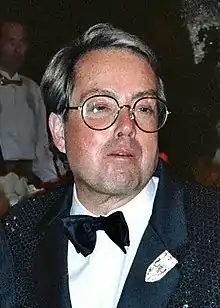
.jpg.webp)
In an attempt to attract viewers to the telecast and increase interest in the festivities, the Academy hired film producer and veteran Oscar ceremony executive talent coordinator Allan Carr to produce the 1989 ceremony.[17][18] In interviews with various media outlets, he expressed that it was a dream come true to produce the Oscars.[19]
Notable changes were introduced in the production of the telecast. For the first time, presenters announced each winner with the phrase "And the Oscar goes to..." rather than "And the winner is...".[20] The green room where Oscar presenters, performers, and winners gathered backstage was transformed into a luxurious suite complete with furniture, pictures, refreshments, and other amenities called "Club Oscar".[21] Instead of hiring a host for the proceedings, Carr heavily relied on presenters often grouped in pairs that had some connection, either through family or the film industry (a theme he billed as "couples, companions, costars, and compadres");[22][23][24][25] not until 2019 would another ceremony lack a host.[26]
Several other people were involved in the production of the ceremony. Jeff Margolis served as director of the telecast.[27] Lyricist and composer Marvin Hamlisch was hired as musical supervisor of the festivities.[28] Comedian and writer Bruce Vilanch was hired as a writer for the broadcast, a role he filled until 2014.[29] Carr had also rounded up eighteen young stars, including Patrick Dempsey, Corey Feldman, Ricki Lake, and Blair Underwood, to perform in a musical number entitled "I Wanna Be an Oscar Winner".[30] Unlike in most Oscar ceremonies, however, Carr announced that none of the three songs nominated for Best Original Song would be performed live.[24]
The telecast was also remembered for being the final public appearance of actress and comedian Lucille Ball, where she and co-presenter Bob Hope were given a standing ovation.[31] On April 26, almost a month after the ceremony, she died from a dissecting aortic aneurysm at age 77.[32]
Opening number
In an effort to showcase more glamour and showmanship in the ceremony, producer Carr hired playwright Steve Silver to co-produce an opening number inspired by Silver's long-running musical revue Beach Blanket Babylon.[33] The segment consisted of an elaborate stage show centered on actress Eileen Bowman dressed as Snow White from Disney's Snow White and the Seven Dwarfs, who comes to Hollywood and is entranced by its glamour.[33] Like Beach Blanket Babylon, the opening act also featured dancers wearing giant, elaborate hats.[33] In a setting designed to resemble the Cocoanut Grove nightclub, Hollywood dignitaries such as actresses Alice Faye, Dorothy Lamour, Cyd Charisse, her husband Tony Martin, as well as Buddy Rogers and Vincent Price were prominently featured, while singer and television producer Merv Griffin sang a rendition of the song "I've Got a Lovely Bunch of Coconuts" (of which he had had a hit recording in 1949). Bowman and actor Rob Lowe then sang a reworked version of Creedence Clearwater Revival's "Proud Mary", with lyrics rewritten to refer to the film industry; it is this song for which the act is infamously remembered.[33]
Critical reviews and public reaction
The show was panned by most of the media publications. Los Angeles Times television critic Howard Rosenberg lamented, "the Academy Awards telecast on ABC was surprisingly devoid of magic. It was on the musty side, and compared with last month's Grammycast, absolutely moribund."[34] Film critic Janet Maslin chastised the opening number, saying it "deserves a permanent place in the annals of Oscar embarrassments". She also bemoaned that the "I Wanna Be an Oscar Winner" number "was confusingly shot and inspired no confidence in Hollywood's future".[35] Television editor Tony Scott of Variety complained, "The 61st Annual Academy Awards extravaganza—seen in 91 different countries including, for the first time, the Soviet Union—turned out to be a TV nyet" He also observed that the "Break-Out Superstars number" looked like they were "cavorting around a giant Oscar as if it were the golden calf".[36]
The telecast also received a mixed reception from professionals within the show business industry. Talent agent Michael Ovitz praised Carr saying that he had "brought show business back to the movie business". Actress Jennifer Jones thanked Carr in a written letter to the producer, which read "You delivered."[37] On the other hand, seventeen people, including actors Paul Newman, Gregory Peck, and Julie Andrews, and directors Billy Wilder and Joseph L. Mankiewicz, signed an open letter deriding the telecast as "an embarrassment to both the Academy and the entire motion picture industry".[38]
There has been speculation that some of the blowback against the ceremony, which was the first produced by an openly gay person and which prominently featured a musical number based on a gay nightclub show, was homophobic in nature,[39] although others, such as Bruce Vilanch and David Geffen, have challenged that assessment.[40]
In addition, The Walt Disney Company filed suit against AMPAS for use of the likeness of Snow White.[41] The lawsuit demanded unspecified damages for "copyright infringement, unfair competition, and dilution of business reputation".[4] Academy President Richard Kahn immediately issued an apology to the studio, and the lawsuit was subsequently dropped.[42]
Bowman has claimed that she was made to sign a gag order the next day prohibiting her from speaking to the press about her performance for the next 13 years. She finally spoke about it publicly in a 2013 interview, in which she described the performance as looking "like a gay bar mitzvah".[43]
Ratings and aftermath
Despite the criticism regarding the production of the ceremony, the American telecast on ABC drew in an average of 42.68 million people over its length, which was a 1% increase from the previous year's ceremony.[3][44] The show also drew higher Nielsen ratings compared to the previous ceremony, with 29.81% of households watching over a 50.41 share.[3] It was the highest-rated Oscar broadcast since the 56th ceremony, held in 1984.[4]
Nevertheless, AMPAS created an Awards Presentation Review Committee to evaluate and determine why the telecast earned such a negative reaction from the media and the entertainment industry.[4] The committee later determined that Carr's biggest mistake was allowing the questionable opening number to run for 12 minutes. Producer and former Directors Guild of America president Gilbert Cates, who headed the committee, said that Carr would have not received such harsh criticism if the number had been much shorter.[4] Cates was subsequently hired as producer of the succeeding year's telecast.[45]
According to various showbiz insiders and reporters, the criticism and backlash from the ceremony resulted in Carr never again producing a film or theatrical show. He died from complications resulting from liver cancer on June 29, 1999, at the age of 62.[33][4]
Box office performance of nominees
At the time of the nominations announcement on February 15, the combined gross of the five Best Picture nominees at the US box office was $188 million, with an average of $37.7 million per film.[46] Rain Man was the highest earner among the Best Picture nominees, with $97 million in domestic box office receipts.[46] The film was followed by Working Girl ($42.1 million), The Accidental Tourist ($24.2 million), Mississippi Burning ($18.6 million), and finally Dangerous Liaisons ($6.69 million).[46]
Of the top 50 grossing movies of the year, 52 nominations went to 13 films. Only Big (3rd), Rain Man (5th), Working Girl (21st), The Accused (32nd), The Accidental Tourist (38th), Gorillas in the Mist (40th), Mississippi Burning (45th), and Tucker: The Man and His Dream (50th) were nominated for Best Picture, directing, acting, or screenwriting. The other top 50 box office hits that earned nominations were Who Framed Roger Rabbit (1st), Coming to America (2nd), Die Hard (7th), Beetlejuice (9th), and Willow (12th).
See also
- 9th Golden Raspberry Awards
- 31st Grammy Awards
- 41st Primetime Emmy Awards
- 42nd British Academy Film Awards
- 43rd Tony Awards
- 46th Golden Globe Awards
- List of submissions to the 61st Academy Awards for Best Foreign Language Film
References
- Osborne 2008, p. 296
- "Past Scientific & Technical Awards Ceremonies". Academy of Motion Picture Arts and Sciences. Archived from the original on February 13, 2014. Retrieved July 31, 2013.
- Gorman, Bill (February 17, 2009). "Academy Awards Show Ratings". TV by the Numbers. Tribune Media. Archived from the original on November 9, 2013. Retrieved September 5, 2013.
- Hofler, Robert (March 1, 2010). "Snow Job". Los Angeles. Archived from the original on October 5, 2013. Retrieved September 13, 2013.
- Williams, Jeannie (February 16, 1989). "Michael's high-profile feast". USA Today. p. 2D.
- Cieply, Michael (February 16, 1989). "'Rain Man' Given 8 Oscar Nominations; Sigourney 2 : Hoffman Wins 6th Acting Nod". Los Angeles Times. Archived from the original on October 4, 2013. Retrieved October 4, 2013.
- Kehr, Dave (March 30, 1989). "'Rain Man' The Big Winner, But Upsets Put Zip In Oscars". Chicago Tribune. Archived from the original on October 5, 2013. Retrieved October 4, 2013.
- O'Neil, Tom (February 23, 2009). "Sean Penn is the ninth actor to win two lead Oscars". Los Angeles Times. Archived from the original on March 8, 2013. Retrieved June 6, 2013.
- Levy 2003, p. 83
- Levy 2003, p. 283
- Price, David (2008). The Pixar Touch. New York: Alfred A. Knopf. p. 106. ISBN 978-0-307-26575-3.
- "The 61st Academy Awards (1989) Nominees and Winners". Academy of Motion Picture Arts and Sciences. Archived from the original on October 6, 2014. Retrieved October 27, 2011.
- Solomon, Charles (March 24, 2000). "Drawing Attention to Canada, Winning Oscars in the Process". Los Angeles Times. Archived from the original on October 6, 2013. Retrieved September 13, 2013.
- "About the Governors Awards". Academy of Motion Picture Arts and Sciences. Archived from the original on September 25, 2013. Retrieved October 4, 2013.
- "Who Framed Roger Rabbit". Academy of Motion Picture Arts and Sciences. Archived from the original on October 18, 2014. Retrieved November 4, 2013.
- Mull, Marrison (March 26, 1989). "Calendar Goes to The Oscars : The Oscar Telecast : Live from the Shrine Auditorium, Wednesday, 6 P.M., ABC-TV (7, 3, 10, 42)". Los Angeles Times. Archived from the original on December 21, 2013. Retrieved September 13, 2013.
- Williams, Jeannie (October 11, 1988). "Twiggy's happy ending". USA Today. p. 2D.
- Volland, John (October 11, 1988). "TV & Video". Los Angeles Times. Archived from the original on October 4, 2013. Retrieved September 14, 2013.
- Culhane, John (March 26, 1989). "For Oscar's Producer, the Key Is C". The New York Times. Archived from the original on October 5, 2013. Retrieved October 4, 2013.
- Pond 2005, p. 11
- Uricchio, Marylynn (March 29, 1989). "Awards show producer is putting posh on Oscar". Pittsburgh Post-Gazette. p. 12. Retrieved October 4, 2013.
- Hofler, Robert (March 1, 2010). "The Worst Oscars Ever". Los Angeles Magazine. Retrieved February 12, 2020.
- Pond 2005, p. 5
- Siskel, Gene (March 26, 1989). "One Man's War Against The Dullest Night On Television". Chicago Tribune. Archived from the original on October 6, 2013. Retrieved October 5, 2013.
- Romero, Frances (March 1, 2011). "No Hosts – Top 10 Worst Awards-Show Hosts". Time. Archived from the original on September 21, 2013. Retrieved September 19, 2013.
- Keegan, Rebecca (February 20, 2019). "The Politics of Oscar: Inside the Academy's Long, Hard Road to a Hostless Show". The Hollywood Reporter. Retrieved February 25, 2019.
- "Credits". Jeff Margolis Productions. Archived from the original on October 5, 2013. Retrieved October 4, 2013.
- Voland, John (October 27, 1988). "Movies". Los Angeles Times. Archived from the original on October 29, 2013. Retrieved October 24, 2013.
- Vary, Adam B. (February 5, 2010). "An Oscar Insider Tells All". Entertainment Weekly. Archived from the original on February 6, 2015. Retrieved October 4, 2013.
- Pond 2005, p. 8
- "Coemdian Lucille Ball suffers a heart attack". The Spokesman-Review. April 19, 1989. Retrieved October 5, 2013.
- Flint, Peter B. (April 27, 1989). "Lucille Ball, Spirited Doyenne of TV Comedies, Dies at 77". The New York Times. Archived from the original on October 6, 2013. Retrieved October 5, 2013.
- Pond, Steve (February 27, 2005). "And the loser is..." Los Angeles Times. Archived from the original on October 6, 2013. Retrieved October 5, 2013.
- Rosenberg, Howard (March 30, 1989). "Overcast for Allan Carr's Oscarcast". Los Angeles Times. Archived from the original on October 5, 2013. Retrieved September 17, 2013.
- Maslin, Janet (March 31, 1989). "Review/Television; The Oscars as Home Entertainment". The New York Times. Archived from the original on October 5, 2013. Retrieved September 17, 2013.
- Hofler 2010, p. 416
- Champlin, Charles (April 4, 1989). "Allan Carr: 'We Won the Town'". Los Angeles Times. Archived from the original on October 6, 2013. Retrieved October 5, 2013.
- Speers, W. (April 29, 1989). "Judge Orders James Brown's Autograph". The Philadelphia Inquirer. Archived from the original on October 4, 2013. Retrieved September 17, 2013.
- Little, Becky (January 22, 2019). "The Scathing Reaction to the Last Oscars With No Host". History. Retrieved January 23, 2019.
- Hofler, Robert (March 1, 2010). "The Worst Oscars Ever". Los Angeles Magazine. Retrieved January 23, 2019.
- Easton, Nina (March 31, 1989). "Disney Sues Over Use of Snow White at Oscars". Los Angeles Times. Archived from the original on September 5, 2013. Retrieved September 17, 2013.
- Vaughan, Vicki (April 7, 1989). "Disney Accepts Apology, Drops Academy Suit". Orlando Sentinel. Archived from the original on October 5, 2013. Retrieved October 5, 2013.
- Abramovitch, Seth (February 20, 2013). "'I Was Rob Lowe's Snow White': The Untold Story of Oscar's Nightmare Opening". The Hollywood Reporter. Archived from the original on May 18, 2013. Retrieved June 7, 2013.
- Johnson, Greg (March 18, 1999). "Call It the Glamour Bowl". Los Angeles Times. Archived from the original on September 28, 2013. Retrieved September 14, 2013.
- Wiley & Bona 1996, p. 768
- "1988 Academy Award Nominations and Winner for Best Picture". Box Office Mojo. Archived from the original on October 5, 2013. Retrieved October 5, 2013.
Bibliography
- Hofler, Robert (2010). Party Animals : A Hollywood Tale of Sex, Drugs, and Rock 'n' Roll Starring the Fabulous Allan Carr. Cambridge, Massachusetts, United States: Da Capo Press. ISBN 978-0-306-81655-0. OCLC 779680732.
- Levy, Emanuel (2003). All About Oscar: The History and Politics of the Academy Awards. New York, United States: Continuum International Publishing Group. ISBN 0-8264-1452-4.
- Osborne, Robert (2008). 80 Years of the Oscar: The Complete History of the Academy Awards. New York, United States: Abbeville Publishing Group. ISBN 978-0-7892-0992-4.
- Pond, Steve (2005). The Big Show: High Times and Dirty Dealings Backstage at the Academy Awards. New York, United States: Faber and Faber. ISBN 0-571-21193-3.
- Wiley, Mason; Bona, Damien (1996). Inside Oscar: The Unofficial History of the Academy Awards (5 ed.). New York, United States: Ballantine Books. ISBN 0-345-40053-4. OCLC 779680732.
External links
Official websites
- Academy Awards Official website
- The Academy of Motion Picture Arts and Sciences Official website
- Oscar's Channel at YouTube (run by the Academy of Motion Picture Arts and Sciences)
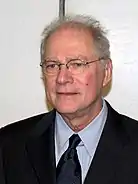
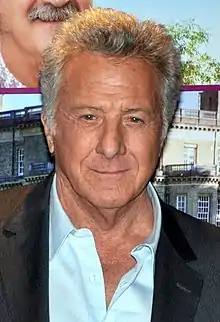


.jpg.webp)



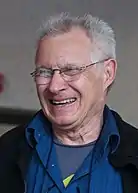
.jpg.webp)
